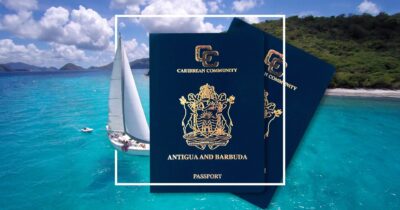

Developing countries are increasingly adopting innovative strategies to spur growth and development, and the Caribbean Five, comprising the Eastern Caribbean countries of Antigua & Barbuda, Dominica, Grenada, and St. Kitts & Nevis St. Lucia, are no different. The countries’ Citizenship by Investment (CBI) programs have emerged as transformative causes in bolstering a nation’s economic standing, as well as contributing to positive socio-economic change.
Today, Caribbean Five’s Citizenship by Investment programs are among the most sought-after, and the revenues make up a considerable part of the nations’ modest economies, reaching 30% of their GDP and 50% of the liquid funds available to the government. The cost of a CBI application starts at a contribution of USD 100,000. The cost increases depending on the size of the application, the specific program as well as the investment option chosen. For example, the cost to apply for a CBI program through a real estate investment starts from USD 200, 000.
Economic Transformation through Infrastructure Development
One of the primary ways CBI programs contribute to a nation’s development is through substantial investments in infrastructure projects, such as roads, schools, and hospitals. In fact, Dominica’s Prime Minister, Dr Roosevelt Skerrit, recently lauded the CBI country’s tangible impacts on communities like Bellevue Chopin, Grandbay, Castle Bruce, and San Sauveur in funding the construction of numerous homes and improved water systems. In the healthcare sector, the Marigot Hospital, a 40,000-square-foot facility with various medical services, was also funded by the CBI program. Furthermore, ongoing developments at international airports signify progress in infrastructure enhancement.
The impact of CBI Programs is also visible in Grenada’s healthcare and educational sectors. Investments have facilitated the modernisation of healthcare facilities, including the General Hospital in St. George’s and St. George’s University, a crucial educational institution. These initiatives improve the quality and accessibility of healthcare services and elevate the country’s standing as an educational hub in the Caribbean.
Furthermore, St. Lucia has introduced an infrastructure option in February 2024 as part of its CBI program, investing foreign capital in various infrastructure projects aimed at enhancing the nation’s development, such as specialist restaurants, cruise ports, agro-processing plants, pharmaceutical production facilities, critical infrastructure like ports and roads, research institutions, offshore universities, housing and social development projects, as well as investment services.
The infusion of capital into infrastructure projects enhances a country’s physical connectivity and improves the overall quality of life for its citizens. Access to better education, healthcare, and transportation networks becomes a reality, uplifting communities and fostering an environment conducive to sustainable development.
Job Creation and Economic Independence
In addition to supporting large-scale projects, the influx of foreign investment from CBI programs also stimulates the growth of local industries. As businesses expand to accommodate increased demand and new job opportunities emerge, Dominica’s Prime Minister, Dr Roosevelt Skerrit, discussed how a benefit from the CBI Program includes the implementation of the National Employment Program (NEP). This has played a pivotal role in alleviating poverty, providing citizens with new homes, and offering financial assistance for post-hurricane recovery.
The direct contributions to the government from the CBI programs also empower smaller nations to achieve sustainable growth independently, mitigating the need for international aid. According to the IMF, “St. Kitts and Nevis entered the Covid-19 pandemic from a position of fiscal strength following nearly a decade of budget surpluses. A significant part of the large CBI revenues was prudently saved, reducing public debt below the regional debt target of 60 per cent of GDP and supporting the accumulation of large government deposits.”
Environmental Conservation and Sustainable Development
CBI Programs have also helped facilitate the sustainable development goals of the countries. The significance of this was underscored during the COP-28 conference held in Dubai, UAE, which highlighted the urgent concerns of Small Island Developing States (SIDS) as they are the most vulnerable to the impacts of climate change and climate-driven disasters. The delegations led by the Prime Ministers of Dominica and St Kitts and Nevis actively participated in the discussions, and Prime Minister, Dr Terrance Drew of St Kitts and Nevis issued a call to action for international partners to collaborate in the collective effort to combat the climate crisis. In their respective countries, CBI programs have also been doing their part by directing funds to environmentally conscious projects, aligning with sustainable and responsible practices.
Dominica is working relentlessly to develop climate-resilient infrastructure, including schools, houses, hospitals, health care centres, emergency shelters, roads and bridges. A key outcome is also the Geothermal Power Plant, which is set to significantly lower electricity costs in Dominica and increase the share of renewable energy in the country’s energy mix from 25 to 51%, reducing greenhouse gas emissions by 38,223 tons of CO2 per year.
Antigua and Barbuda has also showcased a commitment in this space by directing investments to the National Development Fund (NDF), a public financing mechanism dedicated to fostering sustainability, supporting projects such as renewable energy, sustainable infrastructure, and investments in education and healthcare. Regulations are also in place to oversee the real-estate developments which are a main offering of CBI programs. Environmental Protection and Management Act of 2011 mandates that developers conduct environmental impact assessments before commencing construction, ensuring projects do not harm the environment. Investing in these specific real estate projects enables investors to aid the country in reducing its carbon footprint, creating employment opportunities, safeguarding natural resources, and generating revenue—all while enjoying the benefits of second citizenship.
Citizenship by Investment programs has emerged as a powerful tool for fostering positive change in developing nations. By attracting foreign investment, these programs contribute to infrastructure development, job creation, and environmental conservation, leading to a holistic improvement in the socio-economic landscape and ensuring that citizens receive a better quality of life. As nations continue to navigate the challenges of economic transformation, CBI programs stand out as beacons of hope, offering a pathway to both financial prosperity and social well-being.